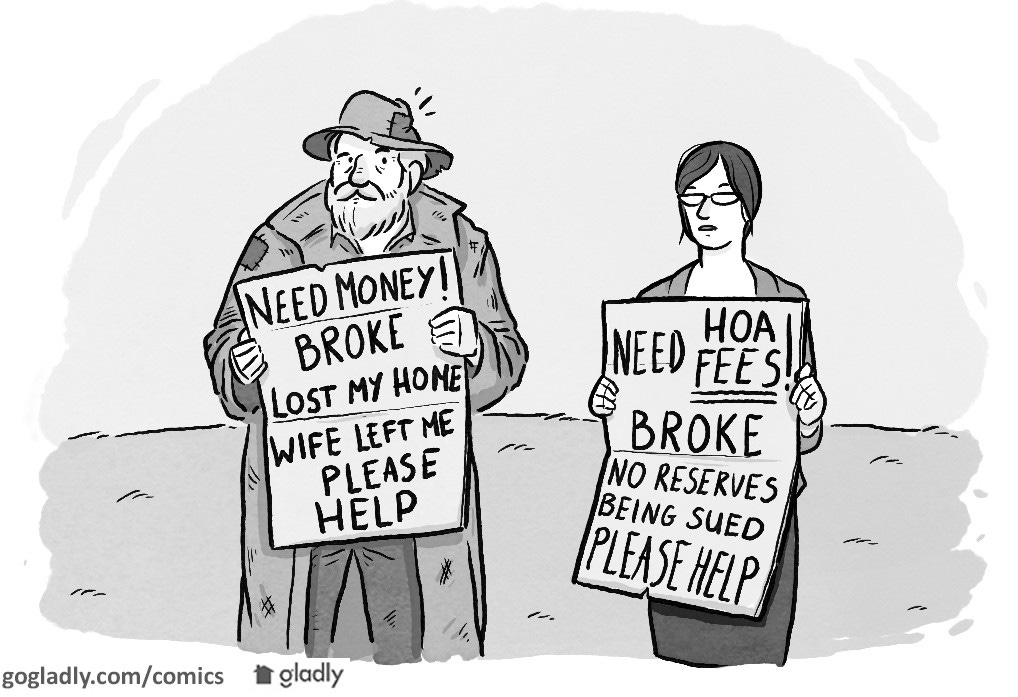Board Leadership / How an HOA can Sharpen Your Skills at Work
Originally posted to LinkedIn Articles October 2022
"Ugh, we got a letter in the mail from the HOA. Let's go complain on the neighborhood Facebook group. Why are there so many rules to living in the burbs of America? What is even the purpose of an HOA other than to annoy people?!"
I have been volunteering with HOAs since 2016, when I first started helping with communications for our neighborhood of 800 homes. There was very little I knew about HOAs at the time; so little that after we bought our first home, we spent the first two years not realizing we had to pay assessments because the title company had used the wrong mailing address. The HOA had zero email communications, little social media interaction, no events, and the only way you knew the HOA existed was when you received a letter about your trash can. This drove me crazy, so I showed up to a meeting and told them I would help build a website and manage communications. A year later I was on the Board, and a year after I was President of the Board. It turns out that many of these positions are quite easy to get involved in, and most of the role requires you to be engaged by doing things like answering emails or showing up to a meeting.
After three years on that first Board, we moved to another neighborhood still in development. Once the development was complete, I became President of that Board as well. I can say with certainty that the leadership challenges I have faced in HOAs is on an entirely different level than in my normal professional work. From being berated in person about tall grass, to running large projects that impact thousands of residents, I have had to manage quite a few challenges while getting paid absolutely nothing to do it (I'll elaborate why later). With these things in mind, I'd like to share how volunteering with your HOA can really sharpen your focus as a leader in many aspects of your life and career.
You Learn the Process
If I were to summarize how HOAs work, it is generally that a group of strangers (i.e., normal everyday homeowners) have to constantly keep tabs on a group of subpar contractors. Seriously, the majority of our work is making sure the Management company is not running afoul by sending countless violations, the pool company is actually showing up and cleaning, the landscaper is mowing where they're supposed to, or that proper maintenance is being done where needed. Most people see their HOA as this shadow organization of over-involved, power-hungry people who want to control their neighbors. While that isn't entirely untrue of some HOAs, the bulk of Board work is actually boring management of constantly crumbling amenities.
But this is where you learn the process. As a Board member you are an officer of a non-profit company. HOAs have contracts with other companies to do things. You have to negotiate those agreements with your attorney. That attorney helps you implement policy. That policy helps you learn the law, because homeowners have rights. You must be involved in decisions about the budget and learn how your company finances work. Accounts can become delinquent and require attention. Plans must be made for the future to help maintain and improve the neighborhood. There are Committees that must be grown and promoted. You must communicate these things to the community. Rinse and repeat.
Understanding the process of a company, even as simple as an HOA, can really open your mind to learning why things are the way they are. You get an inside view to where the issues are and where they can be improved. You become part of the solution. You also learn things like Robert's Rules, e.g. "I motion we ban babies from the pool." These procedures help you learn bureaucracy, for better or worse. If you live within an HOA, joining your Board or a Committee is a simple and easy way to introduce yourself to being a first line leader.
Also, since the HOA must interact with taxing authorities in similar ways to homeowners, you will also learn a great deal about taxes, home market values, appraisals, and exemptions. This in turn helps you with your own homeowner woes, and being plugged in gives you the opportunity to share this knowledge with your neighbors (e.g. how to protest taxes). You are now making positive impact outside of your role on the Board by sharing that knowledge.
You Learn to Communicate
If there are two skills that can benefit everyone, it is an attention to detail and a great ability to communicate. HOAs are a fantastic place to improve your communication skills, because everything you say will be both praised and ridiculed at the same time. This forces you to fine-tune your messaging along with learning how to support your arguments or initiatives. How you approach topics or issues becomes more measured, and you understand that both the words you use and the tones you take impact how well your messaging is received. Words like "us", "we", or "the Board" become much more common than "I" or "me", as you learn even the pronouns you use have an impact.
Although many frown on this, I also believe engaging people on social media is key to communicating with your neighbors. Sending emails is great, but being active in the online discussion shows that you are connected and have a vested interest in their opinions. It can also pull you into never-ending debates on how someone is going to "sue the HOA", but through these interactions you slowly gain a hardiness to how you compose yourself online. I myself have made many mistakes debating neighbors online, but over time I learned more about my own emotional intelligence. Today, I find it easier engage with online conflict in a constructive manner, rather than just ignoring it completely.
Side note, I recommend you be part of the neighborhood groups like Facebook or Nextdoor, but do not be the one to manage it. Leave that to an independent moderator of some kind, as managing a group as a Board member just brings headaches you do not want to deal with.
You Learn Empathy
Sometimes people get behind on their bills. They get sick, they have a death in the family, or they get so far behind on debt that they cannot see their way out. I have helped neighbors get through some of the most difficult parts of their lives when it involved the HOA. Being a leader requires empathy and being part of a Board will eventually require you to exercise these skills.
We once had an elderly woman who was four years behind on her HOA assessments. Before I had joined our Board these delinquent accounts were being quietly ignored, but it was a task the new Board had to rein in. We started sending the attorney after these accounts, with instructions that we wanted to provide them all of the opportunities available to them for payment. Almost all of these accounts were with folks who were extremely down on their luck (or extremely good liars). Many of them required that we listen to their story, see where we could help, and help find a middle-ground where that worked for everyone involved. For the elderly woman, it turned out her finances were on autopilot by a poorly managed Trust. By learning about her situation, we found a solution that worked. Before the end of the year, we had resolved 98% of our delinquent accounts.
Another side note, most of the time you want the Management company or attorney to deal with delinquent accounts. However, if done carefully you as a Board Director can absolutely be part of resolving these accounts.
You will also exercise empathy when dealing with neighbor disputes, like when someone turns their home into an Airbnb and you suddenly have an influx of outsiders creating problems. You can become an agent of change on behalf of homeowners, and this itself has many growth opportunities for you.
You Learn to Develop People
Even within an HOA, you as a community leader can help develop people's confidence and skillsets. There are processes to teach, Committees to build and grow, and neighbors to recruit for challenging tasks. You will find certain people who are extremely knowledgeable in areas like pools, lake maintenance, or finance. Getting them involved can be a challenge, as HOAs are often seen in a negative light, or they do not want to be ridiculed by neighbors. Convincing others, or applying your influence, is a skill you will use throughout your entire life, from your kids to your boss. Once your recruits are involved, they too become invested into the community and may one day join the Board. This is important, because Boards need fresh perspectives every few years, and recruiting them early helps make sure the neighborhood can continue to run after you leave.
You Build Your Confidence
Over the years I have led meetings from two people to 100, and I have been a speaker at multiple conferences. Yet even today I still feel queasy when I know I have to speak at large events. Some folks are natural speakers, but I am one that must be well prepared and rehearsed before I feel great enough to lead a discussion. Knowing your content helps immensely, but the only real way to build confidence in your skillset is to repeatedly do the things you are not good at. An HOA is a great way to be in a consistent spotlight and help build that confidence you need to lead that meeting at work or drive the big initiative you blindly volunteered for.
Being on a Board also forces you to work with other neighbors who may or may not share your views. Great teams are built with diverse opinions, because it forces you to engage in discussions that can range from simple matters to heated issues that impact everyone. This will build upon your abilities to negotiate, influence, and ultimately drive the change you are looking to make. This easily translates into your daily work life.
Closing
I should also mention I sit on other Boards and Committees within my community and work industry. We could probably have an entirely different discussion on the lowest form of government, Municipalities, which have their own challenges and leadership-building aspects. Why do I volunteer and stay involved in these activities? I enjoy it! Being part of solutions to problems, helping drive positive change, and working within my community are just things that I like doing. You have to take the good with the bad, like when you finally finished the Clubhouse repair, only to be yelled at for algae in the lake.
Being on an HOA Board is not a permanent commitment. You could try it for a year or two and see how you like it. I suspect that once involved many people will be surprised how well the can do it. Or they will hate it immensely and send me an angry message for even suggesting it. Only one way to find out!
Last piece of advice if you do join a Board...stay off the local news, and don't become case law.




